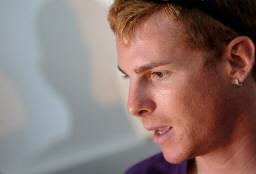Italian doping authorities on Thursday gave cyclist Riccardo Ricco' a two-year ban for doping offences.
The ban from the Italian Olympic Committee (CONI) means Ricco', 25, will be back in the saddle on July 30 2010.
CONI came down harder than expected on Ricco', whose ejection from the Tour de France gained worldwide headlines in July.
Because he admitted taking the banned blood-booster EPO, CONI's prosecutor argued that Ricco's ban should be shortened by four months to 20 months.
The two-year ban includes 18 months for using EPO and an extra six months for Ricco's association with Corrado Santuccione, a doping-tainted doctor who has been disbarred by CONI.
''I'm very disappointed,'' said a visibly upset Ricco'. ''I was expecting more sympathy''.
''I made a mistake and it's only right that I should pay, but I can't talk now, I prefer to leave the matter to my lawyers''.
The rider's defence team said they would decide in a month's time, when the text of the CONI sentence is published, whether to appeal to the Court of Arbitration for Sport, world sport's ultimate appeals body, in Lausanne.
On July 30 Ricco', 25, admitted taking a new kind of EPO in the run-up to the Tour, where new anti-doping techniques managed to catch it.
He apologised to team mates who lost their jobs after the team's sponsor, French heating appliance giant Saunier Duval, pulled out of cycling after the case.
Ricco', who had won two stages with mountain breakaways, was ejected from the Tour at the start of the 12th stage and briefly detained under France's new anti-doping laws.
French authorities said traces of a 'third generation' of EPO called 'Continuous Erythropoietin Receptor Activator' (Mircera) were found in his blood after the Tour's first time trial - the same substance also found in three Spanish riders.
Ricco' may still face criminal charges in France.
After finishing second in the Giro d'Italia and his feats in the Tour, Ricco' was being tipped as a potential heir to Italian cycling's greatest recent climber, Marco Pantani.
Some fans had already started calling him 'the Pirate', the nickname of the bandana-clad Pantani who did the Giro-Tour double in 1998 before doping woes and cocaine use led to his death from a cocaine overdose in 2004. RICCO', THEN SELLA.
The Italian cycling world was shocked by the July 17 news of Ricco's positive test and arrest.
The Italian Association of Professional Riders said riders like Ricco' ''jeopardise the image of the sport and the interests of the majority of riders committed to the fight against the doping mafia''.
The president of the International Cycling Union, Pat McQuaid, called the case ''absolutely shocking''.
The head of the Italian Olympic Committee's Sports Medicine Institute, Antonio Dal Monte, said the effects of Mircera ''could be more dramatic'' than EPO, which strains the heart and carries a high risk of thrombosis.
Mircera was also found in the blood of Italian climber Emanuele Sella, 27, in a spot test just after the Ricco' case exploded.
Sella, 27, who ended up King of the Mountains after three sensational breakaways in the Giro d'Italia, also admitted his guilt and is hoping for a shorter ban than he could otherwise expect.
It was the latest doping-related blow to cycling, a sport whose continued popularity - exemplified by the euphoria surrounding Alessandro Ballan's victory in the World Road Race Championship Sunday - has baffled observers from outside the sport.
CYCLING'S DOPING PLAGUE.
Cycling has been plagued by doping scandals over the years with the more recent cases all involving EPO, the substance that led to Pantani's demise.
The winner of the Tour de France in 2006, Floyd Landis, was stripped of his title, while 2007 Giro winner Ivan Basso was banned for two years and last year's Tour favourites Alexandre Vinokourov and Michael Rasmussen were expelled from the race.
Other top riders to be hit by doping clouds include Jan Ullrich, winner of the 1997 Tour, and Danilo Di Luca, winner of the 2007 Giro d'Italia.
Retired cycling star and current team manager Bjarne Riis last year admitted he used EPO in 1996, when he won the Tour.
Sprint star Erik Zabel, who has just retired, also admitted using it that year.









